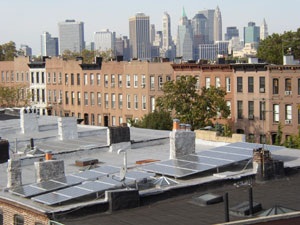NY’s utilities say solar jobs bill will cost customers
 Consolidated Edison Company of New York (Con Ed) is opposed to the New York Solar Industry Development and Jobs Act of 2011, which supporters say would add up to 22,000 solar jobs and spur $20 billion in investments in the state. But Con Ed, the utility that supplies power to most of the Big Apple and most of Westchester County, and other utilities contend that the legislation would lock them into long-term contracts that would raise electric prices for customers.
Consolidated Edison Company of New York (Con Ed) is opposed to the New York Solar Industry Development and Jobs Act of 2011, which supporters say would add up to 22,000 solar jobs and spur $20 billion in investments in the state. But Con Ed, the utility that supplies power to most of the Big Apple and most of Westchester County, and other utilities contend that the legislation would lock them into long-term contracts that would raise electric prices for customers.
The solar legislation has bipartisan support in both houses of New York’s General Assembly and has been a priority for the state’s environmental advocates. But utilities oppose the 15-year solar renewable energy credit contracts that electricity suppliers, like Con Ed Development, would have to purchase under the legislation.
“The solar renewable energy credits would go out to 2024, a 15-year contract. It could possibly go out to 2039,” said Con Ed spokesperson Allan Drury. “We don’t have a breakdown for the bill for our customers, but there are estimates that it would cost customers of investor-owned utilities [a total of] $29 billion through 2039.”
Since Con Ed, a subsidiary of Consolidated Edison, Inc. (NYSE: ED), primarily is a transporter and distributor of electricity, it’s revenue is decoupled from the price of electricity, meaning that the bill would not affect the subsidiary’s earnings, Drury said. Instead, the cost of adding in more renewables would be passed on to consumers, in all, more than 3.2 million of them.
Ron Kamen, CEO of the New York Solar Energy Industries Association, said that it will cause rate payers to pay more. But the cost is capped at a 1.5 percent increase per year. Over time, however, the investments in solar will end in less expensive electricity, he said.
“As a fixed-price energy resource, it will become the least expensive,” he said.
The stability offered by the long-term contracts will make it easier for solar projects to gain financing, according to Kamen.
The legislation would also stimulate New York’s economy, according to Kamen.
“We’re going to get jobs and tax benefits, $20 billion of economic activity,” he said.
But the state isn’t playing well in the solar industry, he said.
“We’re not only losing on the installation side, we’re also losing on the technical development and manufacturing side,” he said. “Right now, there’s not a lot of reason for them [i.e., companies] to invest in manufacturing.”
Con Ed is not against solar, according to Drury. The company supported a $150 million New York State Energy Research and Development Authority solar initiative over the next five years, including $125 million of projects in its service area. It is also working to further reduce permitting time for installing solar.
“What we have here is a renewable portfolio standard and the net-metering law. Our position is let those programs work rather than imposing more costs on customers."
Image courtesy of the New York State Energy Research and Development Authority.



